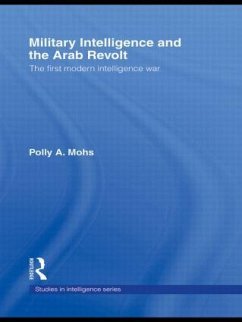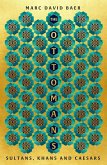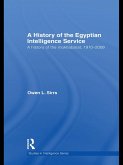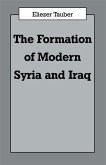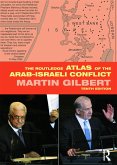- Broschiertes Buch
- Merkliste
- Auf die Merkliste
- Bewerten Bewerten
- Teilen
- Produkt teilen
- Produkterinnerung
- Produkterinnerung
This book examines the use and exploitation of intelligence in formulating Britain's strategy for the Arab Revolt during the First World War. It also presents a radical re-examination of the achievements of T.E. Lawrence (Lawrence of Arabia) as an intelligence officer and guerrilla leader.
Andere Kunden interessierten sich auch für
![The Ottomans The Ottomans]() Marc David BaerThe Ottomans14,99 €
Marc David BaerThe Ottomans14,99 €![The Contemporary Art Scene in Syria The Contemporary Art Scene in Syria]() Charlotte BankThe Contemporary Art Scene in Syria42,99 €
Charlotte BankThe Contemporary Art Scene in Syria42,99 €![The Egyptian Intelligence Service The Egyptian Intelligence Service]() Owen L. SirrsThe Egyptian Intelligence Service62,99 €
Owen L. SirrsThe Egyptian Intelligence Service62,99 €![The Formation of Modern Iraq and Syria The Formation of Modern Iraq and Syria]() Eliezer TauberThe Formation of Modern Iraq and Syria68,99 €
Eliezer TauberThe Formation of Modern Iraq and Syria68,99 €![The Routledge Atlas of the Arab-Israeli Conflict The Routledge Atlas of the Arab-Israeli Conflict]() Martin GilbertThe Routledge Atlas of the Arab-Israeli Conflict44,99 €
Martin GilbertThe Routledge Atlas of the Arab-Israeli Conflict44,99 €![The Use and Abuse of History The Use and Abuse of History]() Marc FerroThe Use and Abuse of History33,99 €
Marc FerroThe Use and Abuse of History33,99 €![The Secret Anglo-French War in the Middle East The Secret Anglo-French War in the Middle East]() Meir Zamir (Israel Ben-Gurion University of the Negev)The Secret Anglo-French War in the Middle East74,99 €
Meir Zamir (Israel Ben-Gurion University of the Negev)The Secret Anglo-French War in the Middle East74,99 €-
-
-
This book examines the use and exploitation of intelligence in formulating Britain's strategy for the Arab Revolt during the First World War. It also presents a radical re-examination of the achievements of T.E. Lawrence (Lawrence of Arabia) as an intelligence officer and guerrilla leader.
Produktdetails
- Produktdetails
- Studies in Intelligence
- Verlag: Taylor & Francis Ltd
- Seitenzahl: 260
- Erscheinungstermin: 1. November 2008
- Englisch
- Abmessung: 234mm x 156mm x 14mm
- Gewicht: 406g
- ISBN-13: 9780415493314
- ISBN-10: 0415493315
- Artikelnr.: 26678207
- Herstellerkennzeichnung
- Libri GmbH
- Europaallee 1
- 36244 Bad Hersfeld
- gpsr@libri.de
- Studies in Intelligence
- Verlag: Taylor & Francis Ltd
- Seitenzahl: 260
- Erscheinungstermin: 1. November 2008
- Englisch
- Abmessung: 234mm x 156mm x 14mm
- Gewicht: 406g
- ISBN-13: 9780415493314
- ISBN-10: 0415493315
- Artikelnr.: 26678207
- Herstellerkennzeichnung
- Libri GmbH
- Europaallee 1
- 36244 Bad Hersfeld
- gpsr@libri.de
Polly A. Mohs is an historian and holds a Phd from the University of Cambridge.
Introduction. Legacies of the First World War. Intelligence: Suspended
Potential. Progress to the East. The Arab Bureau and British Policy 1.
Setting the Scene: British Intelligence and an Arab Insurrection, 1913-15
1.1 British Egypt: Redefining Strategic Security 1.2 Schemes for
Subversion: Arab Opportunities and British Ambivalence 1.3 Political
Negotiations 1.4 The Foreign Office and the Sykes-Picot Agreement 1.5 The
Creation of the Arab Bureau 2. The Outbreak of the Arab Revolt,
May-November 1916 2.1 The Sherif of Mecca Launches Uprising 2.2
Complications for British Support 2.3 Debating Control of the Hejaz
Campaign 2.4 The Hejaz Uprising: A Precedent for Syria? 3. Arriving at a
Doctrine of Guerrilla Warfare, June-October 1916 3.1 The Arab Bureau and
Evaluations of the Arab Forces 3.2 Divided Islam and a Military Stalemate
3.3 Crisis at Rabegh: Debate Over an Immobile Brigade 3.4 A 'Corner Turned'
for the Arab Revolt, and McMahon 3.5 Lawrence's Mission: Advancing a
Strategy of Guerrilla Warfare 4. Intelligence on Trial: The Rabegh Crisis,
November 1916-January 1917 4.1 First Alarm at Rabegh: Intelligence Wanted
4.2 The Military Debate Over Reinforcements 4.3 Intelligence and the
Strategic Detachment from Medina 4.4 The Shield of Rabegh Collapses: The
Turkish Counter-Attack, December 1916 4.5 Intelligence and the Gainsaying
of Wingate 5. Reorientation: The Arab Revolt Shifts North, January-April
1917 5.1 Wejh: Filling the Strategy Vacuum 5.2 Regular Support for an
Irregular Campaign 5.3 Imint and Turkish Redeployment to the Railway 5.4
Tribal Politics and a Northern Migration 5.5 Sigint and a Vanished Option
6. An Unauthorized Policy Triumph: Intelligence and Aqaba, February-July
1917 6.1 Destination: Medina, Jauf or Aqaba? 6.2 Lawrence's Epiphany on
Medina 6.3 Another 'Revolt': The Sykes-Picot Stratagem Stumbles 6.4
Intelligence Assessments: Medina Fades to Syria 6.5 The Best Laid Plans:
Political and Military Intelligence on Aqaba 6.6 Aftermath: Intelligence
Revelations. Conclusion. Theatre Challenges. Regional Expertise: The Arab
Bureau. Lessons: The Lawrence Conundrum
Potential. Progress to the East. The Arab Bureau and British Policy 1.
Setting the Scene: British Intelligence and an Arab Insurrection, 1913-15
1.1 British Egypt: Redefining Strategic Security 1.2 Schemes for
Subversion: Arab Opportunities and British Ambivalence 1.3 Political
Negotiations 1.4 The Foreign Office and the Sykes-Picot Agreement 1.5 The
Creation of the Arab Bureau 2. The Outbreak of the Arab Revolt,
May-November 1916 2.1 The Sherif of Mecca Launches Uprising 2.2
Complications for British Support 2.3 Debating Control of the Hejaz
Campaign 2.4 The Hejaz Uprising: A Precedent for Syria? 3. Arriving at a
Doctrine of Guerrilla Warfare, June-October 1916 3.1 The Arab Bureau and
Evaluations of the Arab Forces 3.2 Divided Islam and a Military Stalemate
3.3 Crisis at Rabegh: Debate Over an Immobile Brigade 3.4 A 'Corner Turned'
for the Arab Revolt, and McMahon 3.5 Lawrence's Mission: Advancing a
Strategy of Guerrilla Warfare 4. Intelligence on Trial: The Rabegh Crisis,
November 1916-January 1917 4.1 First Alarm at Rabegh: Intelligence Wanted
4.2 The Military Debate Over Reinforcements 4.3 Intelligence and the
Strategic Detachment from Medina 4.4 The Shield of Rabegh Collapses: The
Turkish Counter-Attack, December 1916 4.5 Intelligence and the Gainsaying
of Wingate 5. Reorientation: The Arab Revolt Shifts North, January-April
1917 5.1 Wejh: Filling the Strategy Vacuum 5.2 Regular Support for an
Irregular Campaign 5.3 Imint and Turkish Redeployment to the Railway 5.4
Tribal Politics and a Northern Migration 5.5 Sigint and a Vanished Option
6. An Unauthorized Policy Triumph: Intelligence and Aqaba, February-July
1917 6.1 Destination: Medina, Jauf or Aqaba? 6.2 Lawrence's Epiphany on
Medina 6.3 Another 'Revolt': The Sykes-Picot Stratagem Stumbles 6.4
Intelligence Assessments: Medina Fades to Syria 6.5 The Best Laid Plans:
Political and Military Intelligence on Aqaba 6.6 Aftermath: Intelligence
Revelations. Conclusion. Theatre Challenges. Regional Expertise: The Arab
Bureau. Lessons: The Lawrence Conundrum
Introduction. Legacies of the First World War. Intelligence: Suspended
Potential. Progress to the East. The Arab Bureau and British Policy 1.
Setting the Scene: British Intelligence and an Arab Insurrection, 1913-15
1.1 British Egypt: Redefining Strategic Security 1.2 Schemes for
Subversion: Arab Opportunities and British Ambivalence 1.3 Political
Negotiations 1.4 The Foreign Office and the Sykes-Picot Agreement 1.5 The
Creation of the Arab Bureau 2. The Outbreak of the Arab Revolt,
May-November 1916 2.1 The Sherif of Mecca Launches Uprising 2.2
Complications for British Support 2.3 Debating Control of the Hejaz
Campaign 2.4 The Hejaz Uprising: A Precedent for Syria? 3. Arriving at a
Doctrine of Guerrilla Warfare, June-October 1916 3.1 The Arab Bureau and
Evaluations of the Arab Forces 3.2 Divided Islam and a Military Stalemate
3.3 Crisis at Rabegh: Debate Over an Immobile Brigade 3.4 A 'Corner Turned'
for the Arab Revolt, and McMahon 3.5 Lawrence's Mission: Advancing a
Strategy of Guerrilla Warfare 4. Intelligence on Trial: The Rabegh Crisis,
November 1916-January 1917 4.1 First Alarm at Rabegh: Intelligence Wanted
4.2 The Military Debate Over Reinforcements 4.3 Intelligence and the
Strategic Detachment from Medina 4.4 The Shield of Rabegh Collapses: The
Turkish Counter-Attack, December 1916 4.5 Intelligence and the Gainsaying
of Wingate 5. Reorientation: The Arab Revolt Shifts North, January-April
1917 5.1 Wejh: Filling the Strategy Vacuum 5.2 Regular Support for an
Irregular Campaign 5.3 Imint and Turkish Redeployment to the Railway 5.4
Tribal Politics and a Northern Migration 5.5 Sigint and a Vanished Option
6. An Unauthorized Policy Triumph: Intelligence and Aqaba, February-July
1917 6.1 Destination: Medina, Jauf or Aqaba? 6.2 Lawrence's Epiphany on
Medina 6.3 Another 'Revolt': The Sykes-Picot Stratagem Stumbles 6.4
Intelligence Assessments: Medina Fades to Syria 6.5 The Best Laid Plans:
Political and Military Intelligence on Aqaba 6.6 Aftermath: Intelligence
Revelations. Conclusion. Theatre Challenges. Regional Expertise: The Arab
Bureau. Lessons: The Lawrence Conundrum
Potential. Progress to the East. The Arab Bureau and British Policy 1.
Setting the Scene: British Intelligence and an Arab Insurrection, 1913-15
1.1 British Egypt: Redefining Strategic Security 1.2 Schemes for
Subversion: Arab Opportunities and British Ambivalence 1.3 Political
Negotiations 1.4 The Foreign Office and the Sykes-Picot Agreement 1.5 The
Creation of the Arab Bureau 2. The Outbreak of the Arab Revolt,
May-November 1916 2.1 The Sherif of Mecca Launches Uprising 2.2
Complications for British Support 2.3 Debating Control of the Hejaz
Campaign 2.4 The Hejaz Uprising: A Precedent for Syria? 3. Arriving at a
Doctrine of Guerrilla Warfare, June-October 1916 3.1 The Arab Bureau and
Evaluations of the Arab Forces 3.2 Divided Islam and a Military Stalemate
3.3 Crisis at Rabegh: Debate Over an Immobile Brigade 3.4 A 'Corner Turned'
for the Arab Revolt, and McMahon 3.5 Lawrence's Mission: Advancing a
Strategy of Guerrilla Warfare 4. Intelligence on Trial: The Rabegh Crisis,
November 1916-January 1917 4.1 First Alarm at Rabegh: Intelligence Wanted
4.2 The Military Debate Over Reinforcements 4.3 Intelligence and the
Strategic Detachment from Medina 4.4 The Shield of Rabegh Collapses: The
Turkish Counter-Attack, December 1916 4.5 Intelligence and the Gainsaying
of Wingate 5. Reorientation: The Arab Revolt Shifts North, January-April
1917 5.1 Wejh: Filling the Strategy Vacuum 5.2 Regular Support for an
Irregular Campaign 5.3 Imint and Turkish Redeployment to the Railway 5.4
Tribal Politics and a Northern Migration 5.5 Sigint and a Vanished Option
6. An Unauthorized Policy Triumph: Intelligence and Aqaba, February-July
1917 6.1 Destination: Medina, Jauf or Aqaba? 6.2 Lawrence's Epiphany on
Medina 6.3 Another 'Revolt': The Sykes-Picot Stratagem Stumbles 6.4
Intelligence Assessments: Medina Fades to Syria 6.5 The Best Laid Plans:
Political and Military Intelligence on Aqaba 6.6 Aftermath: Intelligence
Revelations. Conclusion. Theatre Challenges. Regional Expertise: The Arab
Bureau. Lessons: The Lawrence Conundrum

